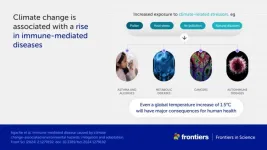(Press-News.org) Cold Spring Harbor Laboratory (CSHL) chemists have created a new collection of molecular compounds and begun testing them as potential leads in the search for new drugs. Among these molecules, they found several that show promise for development as antibiotics and cancer therapies. Sounds like a eureka moment? Well, sort of. But it’s more a case of hard chemistry made simple.
The new compounds were synthesized using an efficient new way of linking molecules together, developed in the lab of CSHL Professor John Moses. Moses calls his innovative process Accelerated SuFEx Click Chemistry (ASCC). It’s one of the latest advances in the Nobel-winning field of click chemistry, pioneered by Moses’ mentor K. Barry Sharpless.
Click chemistry quickly snaps together molecules to create complex new structures. This enables drug developers to assemble large numbers of compounds for further exploration. With Accelerated SuFEx, click chemistry can generate more compounds in fewer steps and with higher yields.
“If you can make molecules, you can test them,” Moses explains. “And with this technology, you can make them fast.”
Moses and his team used ASCC to create more than 150 individual new compounds, including derivatives of complex natural molecules. In the past, it might have taken months to generate and purify such an assortment of molecules. Moses and his team had them ready within days. They then tested these new molecules on cancer cells and drug-resistant strains of bacteria.
In one set of experiments, Joshua Homer, a research investigator in Moses’ lab, synthesized an array of molecules that were similar to an anti-cancer compound called combretastatin A4. Homer found that two of the new molecules could kill cancer cells that typically resist standard chemotherapy. These molecules could someday lead to a solution for difficult-to-treat types of breast and pancreatic cancers.
The researchers also created molecules that resembled an antibiotic called dapsone. They saw that some of these molecules were effective against dapsone-resistant bacteria. Homer says ASCC could help chemists reengineer other complex antibiotics to overcome pathogens’ hardened defenses.
Looking ahead, Moses and his team will continue to use ASCC to explore new horizons of drug discovery and fine-tune their leads into potential drug candidates. Meanwhile, they hope other researchers will also introduce Accelerated SuFEx technology to their own drug discovery platforms.
Summing up the advantages of ASCC, Moses says, “It’s just a way to find function. You can always improve things and optimize. But let’s get there as quick as possible. Hopefully, we can accelerate the whole process.”
In other words, presto chango!
END
Click, click, boom—150 new molecules
2024-04-04
ELSE PRESS RELEASES FROM THIS DATE:
Electric vehicles are lowering Bay Area's carbon footprint
2024-04-04
An extensive CO2 monitoring network set up around the San Francisco Bay Area by an atmospheric chemist from the University of California, Berkeley, has recorded the first evidence that the adoption of electric vehicles is measurably lowering the area's carbon emissions.
The network of sensors, most of them in the East Bay, is the brainchild of Ronald Cohen, UC Berkeley professor of chemistry, who envisions inexpensive, publicly funded pollution and carbon dioxide monitors widely distributed around urban areas to pinpoint emission sources and the ...
SynGAP Research Fund (SRF) awards collaborative grant to advance research of SYNGAP1 related disorders in adults
2024-04-04
Toronto, CANADA & Rotterdam NETHERLANDS – March 2024 – The SynGAP Research Fund 501(c)(3) today announced a grant to Dr. Danielle Andrade, Dr. Miles Thompson, Dr. Ryan Yuen, Dr. Rogier Kerssebook, and Dr. Anatoljevna Anna Kattentidt to support research on SynGAP-Related Disorder (SRD) in adults. SRD is a rare neurodevelopmental disorder that causes severe intractable epilepsy, and intellectual disability, and is one of the leading genetic causes of autism (1,2).
Dr. Andrade’s team recently published the only research on SRD in adults ...
With the planet facing a 'polycrisis', biodiversity researchers uncover major knowledge gaps
2024-04-04
A scientific review has found almost no research studying the interconnections across three major threats to planetary health, despite UN assessments suggesting one million species are at risk of extinction, a global pandemic that resulted in over six million excess deaths, and a record-breaking year of global temperatures.
“When we began to look into it, we had suspicions the number of studies would be low, but not that low,” says Dr. Jonathan Davies, a researcher with University of ...
Liberalization of medical marijuana and mental health in the USA
2024-04-04
The approval of marijuana for medical use has had little effect on the mental health of the general population in the US. But legalization for therapeutic purposes does benefit those for whom it is intended. This is the conclusion of a study by researchers at the University of Basel.
In the US, access to marijuana has been facilitated in most states since the mid-1990s – whether through medical clearance or through decriminalization of recreational use. However, liberalization is still controversial, and the effects on the well-being of specific groups and the therapeutic value ...
Scientists call for urgent action to prevent immune-mediated illnesses caused by climate change and biodiversity loss
2024-04-04
The ecosystems we live in don’t work the way they used to — and that’s bad for our health. Climate change, pollution, and falling biodiversity are all damaging our immune systems. The lack of positive environmental exposures to build the strength of our immune systems, and the increasing negative exposures which attack those systems, are combining to cause a dramatic rise in immune-mediated diseases like asthma and cancer. Measures to protect against this could have a very powerful return on investment: an estimated $1 spent on climate change mitigation saves $3 on healthcare costs. A global ...
Scientists identify rare gene variants which confer up to 6-fold increase in risk of obesity
2024-04-04
A study led by Medical Research Council (MRC) researchers has identified genetic variants in two genes that have some of the largest impacts on obesity risk discovered to date.
The discovery of rare variants in the genes BSN and APBA1 are some of the first obesity-related genes identified for which the increased risk of obesity is not observed until adulthood.
The study, published in Nature Genetics, was led by researchers at the MRC Epidemiology Unit and the MRC Metabolic Diseases Unit at the Institute of Metabolic Science, both based at the University ...
Adult fish struggle to bounce back in marine protected areas
2024-04-04
Age matters when determining how to protect life in the ocean; every population needs a strong cohort of adults to produce the next generation. But many marine protected areas (MPAs) are falling short of their most basic purpose: to rebuild struggling fish populations. In a new study published April 4 in Global Change Biology, scientists looked at the age breakdown of reef fish in marine protected areas for the first time. They discovered in almost all of them, adult fish populations have either flatlined or declined.
“Adult fish are really important,” said ...
Mayo Clinic study finds active workstations may improve cognitive performance
2024-04-04
ROCHESTER, Minn. — A recent Mayo Clinic study suggests that active workstations incorporating a walking pad, bike, stepper and/or standing desk are successful strategies for reducing sedentary time and improving mental cognition at work without reducing job performance. Extended sedentary behavior, whether at work or home, increases a person's risk of preventable chronic diseases.
"Our findings suggest that it is feasible to blend movement with office work that previously would have been done during long periods of sitting. Active workstations may ...
Tracing the largest solar storm in modern times from tree rings in Lapland
2024-04-04
A research group coordinated by the University of Helsinki was able to measure a spike in radiocarbon concentration of trees in Lapland that occurred after the Carrington flare. This discovery helps to prepare for dangerous solar storms.
The Carrington Event of 1859 is one of the largest recorded solar storms in the last two centuries. It was seen as white light flares on a giant sunspot group, fires at telegraph stations and disturbances in geomagnetic measurements, as well as aurorae even in tropical regions.
In a joint study carried ...
Shy sea anemones are more likely to survive heatwaves
2024-04-04
Even in nature, pride can prevail. A study with researchers from the University of Gothenburg shows that sea anemones that react more slowly to change can survive a heatwave better than individuals that change their behaviour quickly.
Along the Atlantic coasts of Europe, many species are exposed to abrupt shifts in habitat. Tides, storms and rapid temperature changes are commonplace for the marine species that live there. With climate change, heatwaves are expected to become more frequent, and researchers wanted to find out how coastal marine species cope with extreme water temperatures. They chose to study the sea anemone species Actinia ...





